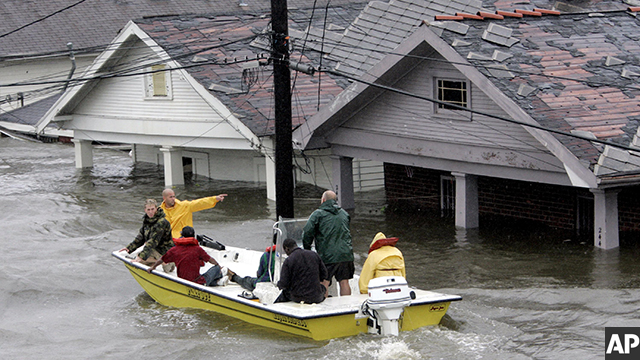Authored by Jeff Wise, HEFN Program Director, “Improving Health and Equity While Addressing Climate Change,” Health Affairs Blog, Feb. 27, 2018, https://www.healthaffairs.org/do/10.1377/hblog20180223.967651/full/ Copyright © 2018 Health Affairs by Project HOPE – The People-to-People Health Foundation, Inc.

Foundations are often criticized for “working in siloes”—approaching complicated social problems through a narrow lens. For a complicated issue like climate change, which has multiple causes and consequences, considering that bigger picture may point to solutions. This idea was highlighted by the Lancet Commission on Climate and Health, which pointed to climate change as being simultaneously a threat to fifty years of public health gains and this generation’s greatest public health opportunity.
According to a Health and Environmental Funders Network (HEFN) and ecoAmerica report, the same activities that cause climate change are having direct impacts on health, including respiratory, cardiovascular, neurodevelopmental, and other health problems. Compounding this harm are the health effects of climate change itself. Climate change produces changes in weather and increases in the frequency and severity of extreme weather events, which in turn can cause injury and increase the spread of infectious diseases. Climate change already is worsening air quality and increasing the incidence and severity of respiratory diseases such as asthma. Climate change is impacting many natural and human systems that are critical for supporting human health, such as agriculture, infrastructure, and the economy.
In that spirit, five funder networks convened almost eighty funders from different fields in a November 2017 “Charting a Climate, Health, and Equity Agenda” meeting in Detroit, Michigan, to focus on the interconnections among climate change, health, and social equity interests. Some of the attending foundations included the Heinz Endowments, the W. K. Kellogg Foundation, the Kresge Foundation, the New York Community Trust, the California Wellness Foundation, the Energy Foundation, and the Park Foundation.
Converging Problems
For the Climate and Energy Funders Group, the Environmental Grantmakers Association, the Funders’ Network for Smart Growth and Livable Communities, Grantmakers In Health, and HEFN, the trends are concerning: As climate change and its associated pollution accelerate, health effects from the causes and the effects of climate change will impact every region of the United States, with many vulnerable populations particularly hard-hit.
The funders’ meeting included a review of climate-change effects on urban, rural, and coastal communities, including effects from heat waves, extreme storms, and floods and from major temperature and precipitation changes. Also noted were projected impacts on low-income people, including the urban poor, farmworkers, and immigrant communities, as well as on children, seniors, and people with chronic medical conditions who have heightened vulnerability to declining air quality, to water- and food-borne illnesses and vector-borne diseases, and to increased heat.
Converging Solutions?
The meeting agenda also reflected reasons for optimism, by highlighting ways in which groups facing the effects of climate change are taking action to prepare communities, protect health, and build resilience. Funders explored the notion that the effects of climate change on humans generate a demand for solutions as affected communities become aware of the threat. Climate-affected urban areas are becoming hotspots of innovation in energy, health care preparedness, housing, green space (such as parks, greenways, and corridors for water runoff and urban wildlife), active transit (such as bike lanes and pedestrian walkways), storm water management, and healthier forms of economic development. Rural communities are advancing sustainable food production, land and water conservation, and solar and wind energy production, as well as capturing carbon through forests and farms.
The meeting also highlighted examples of populations and sectors recognizing what’s at stake and becoming strong forces for action. The funders that gathered heard from farmworkers whose self-help health programs were being expanded and re-purposed to mobilize farmworkers to educate policy makers about the health effects of climate change; poor rural and urban communities that found common cause over access to water; nurses who were organizing seniors to demand more assistance for times when disasters strike; health leaders helping hospitals to prepare for disasters and “green” their operations; and researchers who were finding new linkages between fossil fuel pollution and health problems like dementia, autism, and others.
Funders were challenged to think about how funding could reach those most affected after climate-driven hurricanes, wildfires, and floods, and to help local communities prepare for the next climate-driven health disaster—by treating communities as innovators rather than victims. One speaker showed what happened when a community owned the technology to produce clean water in a disaster, could access food stores that it owned, and could manage its own community-controlled disaster fund.
Next Steps On Uncertain Terrain
For many of the funders that participated, focusing at the intersections of climate, health, and equity is relatively new ground. The meeting’s final brainstorming discussions highlighted a lot of enthusiasm for further work, including interventions, on these problems in an interdisciplinary way. Funders expressed a good amount of interest in drilling down further into understanding the interdependencies among the issues; identifying current and potentially new projects that address environmental, health, and social equity challenges at the same time; investing in efforts to help the public understand how climate change affects social inequities and health; and distilling best practices for succeeding at projects with numerous cross-over benefits.
As in every endeavor that is at the frontiers of knowledge and experience, brave funders will be forging ahead, feeling their way along the terrain, and trying to figure out what works at this new crossroads—where some of the world’s most important challenges are converging.
Related Reading:
“Our Climate Change And Health ‘Moment’: How Philanthropy Can Help,” by Matt James, Health Affairs Blog, March 30, 2017.
“Foundations Begin Investing In Climate Change And Health: New Report,”by Karla Fortunato, Health Affairs Blog, June 17, 2015.

